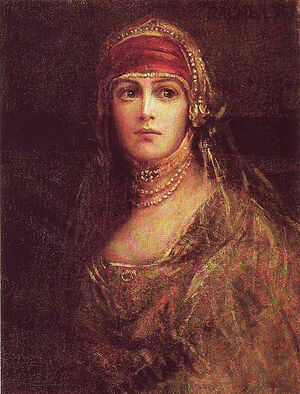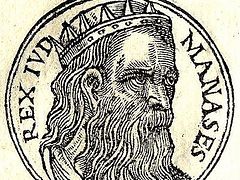 “Rachel” by Maurycy Gottlieb Has it ever surprised you that St. John the Evangelist in his Gospel refers to himself several times as the beloved disciple, literally, the disciple whom Jesus loved (Jn. 13:23)? Have you ever thought about why the Lord singled him out among the twelve apostles? Could it be that the Lord was partial and had favorites? Why does St. John remind us about that several times with no false modesty (cf. Jn. 13:23; 19:26; 21:7; 21:20)?
“Rachel” by Maurycy Gottlieb Has it ever surprised you that St. John the Evangelist in his Gospel refers to himself several times as the beloved disciple, literally, the disciple whom Jesus loved (Jn. 13:23)? Have you ever thought about why the Lord singled him out among the twelve apostles? Could it be that the Lord was partial and had favorites? Why does St. John remind us about that several times with no false modesty (cf. Jn. 13:23; 19:26; 21:7; 21:20)?
I found an unexpected explanation in a most interesting book by the contemporary Biblical scholar Dr. Brant Pitre, Jesus and the Jewish Roots of the Virgin Mary. Pitre is a Roman Catholic, and we can’t accept all of his interpretations of the Bible. However, his books can help us better understand the beliefs of the Jews in the time of Christ. They may be useful in our polemics with Protestants—that is, with Christians for whom the Bible is the sole authority. As I see it, his version regarding Christ’s special relationship with St. John does not at all contradict the interpretations of the Church Fathers, and may well simply force us to look at this matter from an unfamiliar perspective.
To begin clarifying the situation, let’s review.
The Church of the New Testament originates from Jesus Christ and the Apostles, just as the Church of the Old Testament—the Israelites—originated from Joseph the Righteous and his brothers. Joseph the Righteous, who was betrayed by his brothers and then forgave them, prefigured Jesus Christ.
Let’s remember Joseph’s family. Of all of the sons of Jacob (who was also called Israel) only two were the children of Rachel: the best (Joseph) and the youngest (Benjamin) ones, while the other ten brothers were born of other women. Jacob loved Joseph more than any of his other sons. And Joseph himself singled out Benjamin (the youngest son) from among his other brothers because they had the same mother—Rachel. So Benjamin was the beloved brother of Joseph the Righteous.
Jesus also singled out the youngest of His apostles—St. John, since they were destined to share the same Mother: The Most Holy Theotokos. (Do you remember how the Lord, on the cross, said to John: Behold thy Mother, and to Mary: Behold Thy son (Jn. 19:26-27))? Church Tradition consistently maintains that St. John was the youngest of the twelve apostles.
“By referring to himself as the ‘beloved disciple,’ John indicates that he takes the same position amongst the twelve apostles that Benjamin once took among the twelve sons of Jacob: the ‘beloved’ younger son of Rachel and brother or Joseph,” writes Brant Pitre.1
Interestingly, it is Benjamin who is called “the beloved of the Lord” in the blessing of Moses:
And of Benjamin he said, The beloved of the Lord shall dwell in safety by him; and the Lord shall cover him all the day long, and he shall dwell between his shoulders (Deut. 33:12).
Now, here are some of my own modest reflections on what I read.
Rachel the foremother gave birth to Benjamin, her second (and last?) son, on her way to Bethlehem, in horrible pains, from which she died; the Theotokos, on the other hand, received Her second (and last?) son, St. John, at the Crucifixion in terrible anguish, which St. John Damascene compared to labor pains.2
I purposely added the question marks when referring to Benjamin and John as the last sons of Rachel and the Theotokos respectively. The last, but not really the last… Perhaps you have already guessed what’s coming next.
Let’s recall the Book of Jeremiah. A thousand years have passed since Rachel’s death. The Jews were subjected to great punishments by God for their sins. First, the Northern part of Israel was taken over by pagans and its residents were driven from their homes, but soon after (as the prophet warned in his book) the people of the Southern kingdom were taken into captivity by pagans too… And yet when it seemed that any hope for the captives’ salvation had died, the lamentation of Rachel was heard above the road down which the woeful Israelites were being led:
A voice was heard in Ramah, lamentation, and bitter weeping; Rachel weeping for her children refused to be comforted for her children, because they were not. Thus saith the Lord; Refrain thy voice from weeping, and thine eyes from tears: for thy work shall be rewarded, saith the Lord; and they shall come again from the land of the enemy. And there is hope in thine end, saith the Lord, that thy children shall come again to their own border (Jer. 31:15-17).
Let’s ask ourselves: was Rachel weeping for her natural children, for the descendants of Joseph and Benjamin alone? That is, only for those descended from the tribes of Benjamin, Manasseh and Ephraim? Or did she consider all Israelites her children, even those belonging to the tribe of Judah (as you certainly remember, the Judeans were not Rachel’s descendants by blood as Judah was Leah’s son)?
Ancient Jewish tradition maintains that: First, Rachel interceded before the Almighty for all Israelites, regarding all of them as her children; second, the Lord had mercy on the Jewish people in particular through the intercession of Rachel and because of the great sorrows that Rachel the foremother had endured in her lifetime.
There is a midrash among the Jews, that is to say, a legend. When the Israelites were being taken into captivity in Babylon, Abraham and Moses stood before the Throne of God. They wept bitterly and implored Him to forgive the miserable exiles, but the Creator did not heed their entreaties. And it was not until God heard the voice of Rachel, weeping for her children, that He said, “For thee, Rachel, for thy tears and the sorrows thou hast endured, I shall return the exiled children to their motherland.”
This is how the story from the Book of Jeremiah was understood by the Jews themselves, most likely even at the time of Christ. And to this day Jewish believers call her “our mother, our mama Rachel” and gather at her tomb on the way to Bethlehem in the hope of her intercession before the Almighty.
In light of this, is it strange that we Orthodox too (I address this question to our Protestant friends) address Rachel, seeking her intercessions? And is it strange that we seek the intercessions of Her Who is higher than Rachel and Who found favor with God and is blessed… among women (Lk. 1:28, 30)? She Who, by adopting John, the youngest of the apostles, at the Cross, adopted in him all of us, unworthy children of the Orthodox Church, just as Rachel had once, in her terrible labor pains, adopted all the sons of ancient Israel…
Returning to the question at the beginning of this article, why was St. John the Evangelist the disciple whom Jesus loved? A possible answer is because John, as the youngest, symbolizes all of us, Orthodox Christians—even those who are younger and have yet to be born.
Those whom, at Christ’s behest, the “New Rachel” adopted at Golgotha as She suffered the worst of torments.




